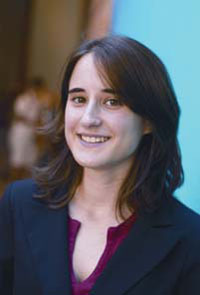This is the sixth in a series of profiles of our MIT Energy Fellows—graduate students who are supported by MIT Energy Initiative (MITEI) members to participate in faculty-led research and become part of a long-term community of students and alumni.

Greenhouse gas emissions don’t respect national borders—they can “leak” from one country to another. Mar Reguant-Rido and her fellow economists hope to find and plug potential leaks before they happen.
“Emissions leak” conjures up an image of gases spurting out of a faulty valve. To economists working in a world that is still powered largely by fossil fuels, these leakages result when one region’s policies encouraging low-cost fossil fuel consumption have the effect of increasing emissions in other regions as buyers flock to the cheaper energy source. “You shut it down in one place, and it starts leaking somewhere else,” Reguant-Rido said.
Reguant-Rido, one of 40 MIT Energy Fellows, is sponsored by MITEI sustaining member company ABB Research Ltd. ABB is a global power and automation technology group.
Working with Stephen P. Ryan, Silverman Family Career Development Assistant Professor of Economics, and Professor of Economics Nancy L. Rose, Reguant-Rido creates economic models that predict the effects of factors such as international competition, costs and plant capacity on energy-intensive industries with the goal of reducing carbon emissions.
“What we are basically trying to do is have a model explain firms’ behavior,” she said. “For instance, what would happen if you introduce cap and trade? At what rate would you get a cleaner profile for the industry?” These models are crucial for informed policy making, she said.
Reguant-Rido is looking at the Spanish power system’s electricity market. “I use hourly data for several variables, such as energy produced by each of the plants, bids that they submit at the electricity wholesale market, availability of the plants, etcetera,” she said. Although the results are preliminary, Reguant-Rido said that with MIT’s Center for Energy and Environmental Policy Research (CEEPR), she helped determined that the allocation of free permits during the trial period of the European Union Emission Trading System, the largest multi-national emissions trading scheme in the world, did not seem to change the short-run production decisions of Spanish electricity plants. She is now assessing whether that initial allocation of free permits had significant long-term effects.
Reguant-Rido is also starting to look at the worldwide cement industry. She is collecting data on the production and capacity of the plants in each of the regional markets; benchmark emissions rates for different types of plants; and imports and exports. The goal is to determine patterns and amounts of leakage of greenhouse gas emissions as a result of international trade in cement given different greenhouse gas regulatory mechanisms. What, for example, is the relative balance of emissions when the United State reduces cement production but increases imports of the product?
“We use data from industries and try to infer how a particular environmental policy will affect both qualitatively and quantitatively the industry as a whole and emissions outcomes,” she said. “Some might expand or reduce their capacity, older, less-efficient firms may exit the field and new ones may start up. These factors will all have an effect on results.”
Market appeal
Reguant-Rido grew up in a small Spanish town near Barcelona. With her father being the town physician and her mother a schoolteacher, she got to know “many, many people” and everyone knew her. “It was a very quiet place,” she said. She played the piano and, as a sophomore in college, wrote a musical for children that she performed with primary school students at a conservatory near her hometown. “Growing up there was a good experience,” Reguant-Rido said.
She ventured to nearby University Autonoma in Barcelona to earn a bachelor’s degree in economics, and spent a year as an exchange student at the University of Mannheim in Germany. Already fluent in English, Spanish, and Catalan, her native language, Reguant-Rido wanted to add German to her repertoire. If she ended up working in economic policy in the European Union, she said, “It’s useful to know more than one of the leading languages.”
Reguant-Rido chose MIT because “economics at MIT is a very reputable program, very often ranking number one.“
A class with Professor Paul Joskow introduced her to “the fascinating world of electricity markets. I really like it. After working with him, I decided to specialize in energy markets.”
She stresses the importance of understanding how the introduction of cap-and-trade policies and permits would affect the price of electricity and the behavior of electricity markets, which is often uncertain due to the changing cost of inputs, price, and demand fluctuations.
“There is need for risk management with a resulting array of financial instruments that can be quite sophisticated,” she said. “The electricity market has a potentially huge effect on emissions and climate change. Many people don’t know that the markets for electricity are so complicated,” she said. (Or that emissions leak.)
After a summer at MIT’s CEEPR, when Reguant-Rido conducted her first research on electricity markets and pollution permit mechanisms, she received the ABB-MIT Energy Fellowship from the Department of Economics.
“I am very happy about the program. I like the fact that we organize some common events and I get to know about energy research in other fields. We also try to ask interdisciplinary questions, and I think this helps better frame our research,” she said. “I just wish I had more time to participate in the events!”
Press inquiries: miteimedia@mit.edu